Would you get into your car and start driving to a destination without knowing the way?
Never!
Would you buy a new washing machine without reading reviews or comparing models?
Unlikely!
Are you going on an outdoor picnic without looking at the weather forecast first?
Probably not!
The fact is that in everyday life you do a little recon work before making decisions. In other words, you research first before you take action.
And your content marketing should be no exception!
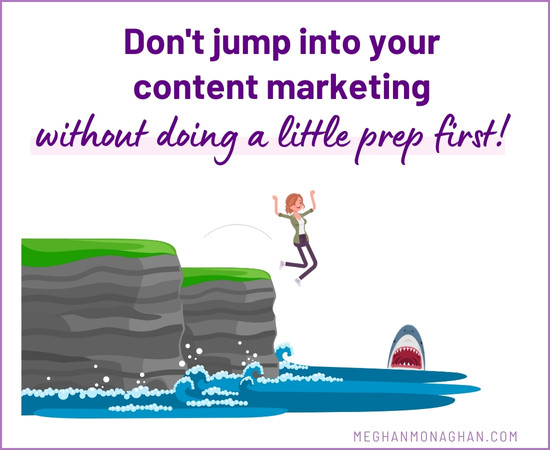
Content research helps you to plan ahead and minimize risk so that you don’t waste time or money. It helps you generate ideas and focus on the right content that will be profitable for your business.
And by profitable content, I mean blog, video, or podcast content that will:
- rank higher in search for the right keywords (so more people find you who are relevant to your business)
- align with your offers (so you sell more stuff)
- attract more qualified leads (so that the right people find you for better conversion rates).
These things are why you’re doing content marketing in the first place, yes?
That’s why I’m going to shorten the learning curve on content research. Then maybe…just maybe…you will make research a regular part of your content marketing!
In this post, I’m sharing:
- what content research is
- why content research is important to effective marketing
- the different types of content research
- tools to help you
- where to start
Let’s go!
What is Content Research?
Content research is the process of gathering and analyzing information and insights to inform your own content marketing strategy and plan.
The main goal of content research is to guide you in your effort to create written, video, or audio content that:
- attracts your target audience,
- generates qualified leads,
- takes prospects through the different stages of making a buying decision,
- outperforms the competition in searches, and
- supports your business goals.
As such, it is an important step in two phases of content marketing: 1) Strategy and Planning and 2) Creation.
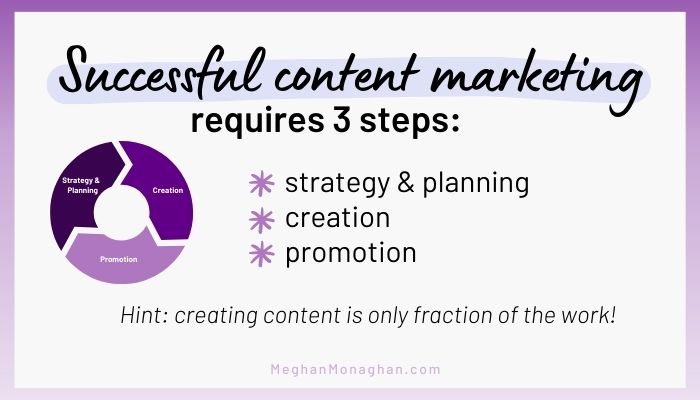
Content Research for the Strategy and Planning Phase
When you’re coming up with a content strategy, you will perform research to help you determine what content types and topics attract your target audience and support your business goals.
You’ll also research the competition’s content to discover:
- who ranks high in search engines
- what topics are relevant
- which brands are your competitors online (in search engines)
Looking at competing content gives you valuable insight into SEO tactics and content ideas.
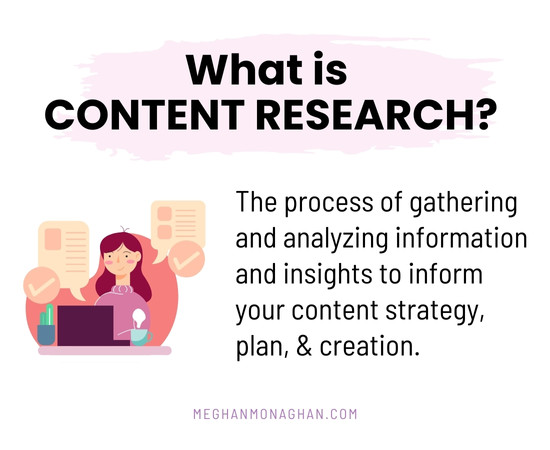
Content Research for the Creation Phase
After you plan your strategy and topics, you’ll need to move on to creating the content.
As a part of the creation process, content research helps you understand what your target audience wants/needs to know. It also helps you identify what to include in each piece of content based on the competition and your own ideas.
Researching content makes it easier to create an outline and to rank higher in search.
And, you will research content when you’re updating outdated, older content.
Why Content Research is Important to Your Marketing Success
Overall, content research makes your content strategy and implementation more effective because it offers data, information, and insight that you can analyze to determine your own direction and path.
It helps you create content that is unique, builds your authority, surpasses the competition, meets your business goals, and generates qualified leads so that you get more sales.
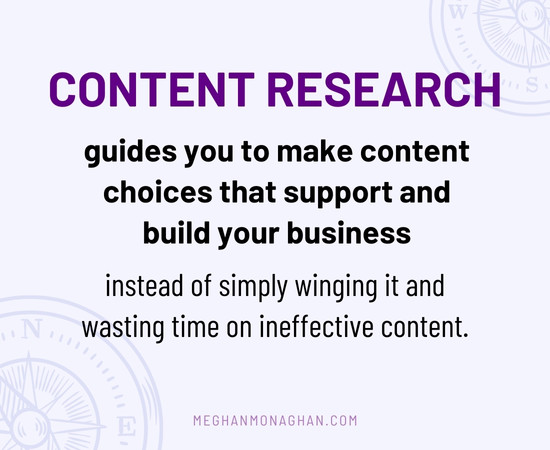
Have you ever sat down, unprepared, to create content without any real forethought or strategic planning?
It happens! Content marketing can be an afterthought since there’s so many other priorities that take precedence.
You see, haphazard content creation leads to less effective marketing. If you skip planning ahead, you’ll end up creating content based on your assumptions, opinions, guesses, preconceived notions, emotions, whims, and even your mood.
Not ideal!
You need solid data to come up with content that will get discovered online and attract qualified leads.
Content research gives you that data. It makes your content strategy more effective by:
- Guiding you through what your audience wants
- Revealing the competition and what you’re up against so that you can do better
- Showing you what’s ranking high in search engines
- Informing you of industry trends
- Assessing your existing content’s performance
And, all of that information is knowledge and power. You’ll be able to save time and money by focusing on the content that is more likely to generate leads and sales.
Types of Content Research
When it’s time to research, you’ll find that there is so much information available these days! You’ll need to perform different types of research based on what you’re trying to accomplish.
Here are some of the types of content research and what you’d use them for when it comes to your strategy, topics, and creation.
1. Demographic Research
Need to better understand your target audience or your market in general? You may want to investigate their demographics, which are the characteristics such as:
- age,
- gender,
- geographical location,
- income,
- marital status, and
- education
This information helps you to understand your audience’s preferences, needs, and desires. In addition to guiding your content efforts, demographics may reveal patterns that help you develop services and your marketing messages.
Since demographic information can be difficult to find, here are a few resources for you:
U.S. Census Bureau
Pew Research Center
Statista
Marketresearch.com reports
ChatGPT
2. Psychographic Research
Knowing the demographics of your target audience isn’t the only way to understand them better. You may want to do psychographic research to gather information about your ideal audience’s values, motivations, attitudes, interests, and lifestyle.
Typically, demographics and psychographics are combined to determine spending behavior, lifestyle habits, and buying trends in certain markets.
“Demographics explain who your buyer is, while psychographics explain why they buy.” – Hubspot
Understanding your audience’s psychology is powerful since it’s influential. Once you get a sense of what’s in your prospect’s mind, you can create content that appeals to them more emotionally. This is critical to your sales because people buy based on how they feel!
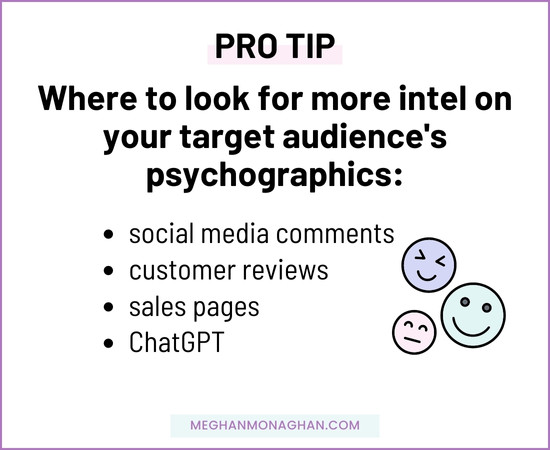
Pro Tips
To help you understand the emotions of your target audience, look at comments on social media and customer reviews. You can discover so much about why people buy (or don’t) and how they feel by spending time gathering feedback from the horse’s mouth, as they say!
Look at your competitors’ sales pages for indications of how your target audience feels and their psychographics. Sales pages are typically written by experienced copywriters who know how to appeal to potential buyers. If a competitor has a similar target audience as you do, then their sales pages will be a treasure chest of insights that can help you with your content research and understanding your ideal customer!
An AI tool like ChatGPT may also be able to offer insight.
3. SEO and Keyword Research
When you’re developing a content strategy and creating content, you want it to rank in search engines and attract qualified leads. That’s why you should always perform SEO and keyword research.
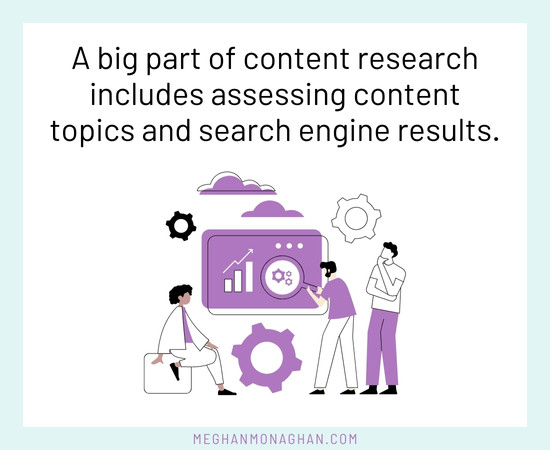
Before you create any content, do keyword research to identify what topics your prospects are searching for online before they buy.
And, you need to know what content and what websites are ranking in the top spots on Google. This information guides you with what content to create and why. Don’t underestimate figuring out the search intent of phrases and whether certain content is or isn’t valuable for your business.
“Search Intent (also known as “User Intent”) is the main goal a user has when typing a query into a search engine. Common types of Search Intent include informational, commercial, navigational and transactional.” – Backlinko
SEO and keyword research helps you to create content that is optimized for search engines, your desired audience, and your business!
4. Competitor Research
You need to know what you’re up against, so studying the competition’s content is always a good idea. Plus, it’s an awesome win for marketing productivity and keeping your marketing efforts to a minimum so you can focus on other tasks.
Look into everything that has to do with your competitions’ content marketing:
- topics/themes
- content types and formats
- frequency of posting
- search ranking
- messaging
- engagement
Overall, it helps your business to perform competitor research—aka competitor analysis—for more than just content. Look at their offers, positioning, branding, and anything that can help guide you in your own endeavors.
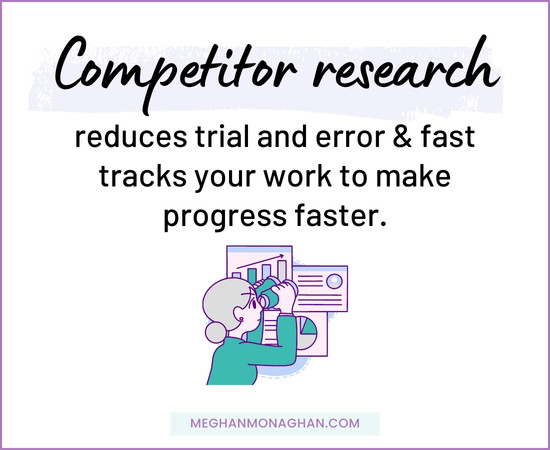
Why not take advantage of those who have gone before you? Competitor research reduces some of your trial and error in your content marketing efforts. You’ll fast track your work by using the competition’s examples and experience to move farther ahead faster.
Plus, getting a handle on the competition points out where you can differentiate your business.
Bonus Tip
Research the website and online presences of businesses that are “content competitors” online as well as those who are “business competitors.” Let me explain.
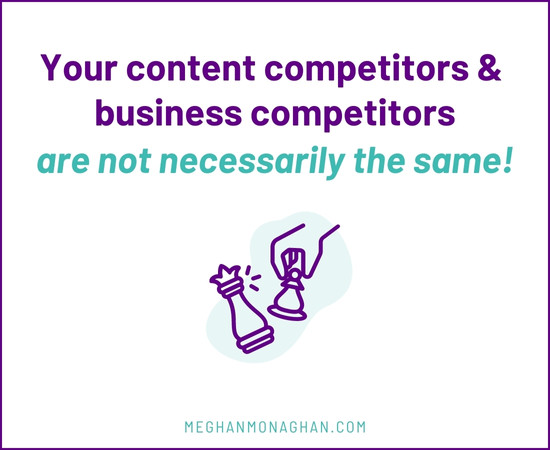
There will be websites you compete with over content topics but that may not offer similar services. These are “content competitors” since they are who you need to worry about stealing attention away from your content. For example, Hubspot writes about the same topics as I do, but they are a business app.
“Business competitors” are the businesses that you compete with for customers or clients because you offer the same or similar services. You may or may not be content competitors with these businesses.
To learn more competitor analysis, check out the podcast episode we did on it for the Messy Desk Podcast:
5. Self-Assessment
Sometimes, you gotta research your own work! As my dad says, “what’s not inspected, isn’t respected.”
If you already have blog, video, or audio content, then that’s another avenue of research to embark on. Do a content audit manually or use an app to help you assess how well your content is performing in search engines. Don’t forget to also assess the effectiveness of your content in terms of meeting business goals and generating leads and sales.

An audit will also help you pinpoint which content is bringing in the leads so that you can invest more in similar content. Plus, you’ll ascertain the content that may be worthwhile updating or areas where you may want to include a lead generation opportunity.
In addition to the audit, be sure to do a “content gap analysis.” This research will show you what content you’re missing. Maybe that’s content for leading a person through the customer journey to help them make a buying decision. Or, maybe it’s content that your competition has but you don’t—and you assess that you need it to reach goals or build authority.
“A content gap analysis is the process of finding holes in your existing content. It involves identifying missing content pieces that could and should align with the various stages of your target audience’s buyer’s journey.” – Search Engine Journal
A look at your content marketing metrics will give you an idea if you’re reaching your goals or if you need to modify your approach. So, make sure that your content research includes analyzing your own content!
6. General Content and Marketing Research
Don’t overlook the value of simply consuming the content and marketing in and outside of your space.
Read blog posts, watch videos, listen to podcasts, check out sales pages, browse social media, look at books on Amazon, google topics…
The process of ingesting the content of those in your industry or adjacent to your industry can spark creativity, generate ideas, and help you gather audience insights while getting a vibe for the competition. Plus, it gives you intel that you may otherwise not get from a tool or one quick Google search.

Keep your eyes and ears open! This is about developing your skill of gathering information and analyzing it as a habit. Over time, you develop an ability to go deeper and see content at a strategic level. You see more than just an article or video here and there; you see how the sausage is made! (Vegan sausage of course!)
Content Research Tools
Now that you know the types of research that you may want to use, let’s talk about some tools to help you perform that research.
There are oodles of content research tools! Which one (or ones) you choose will depend on your goals, budget, skills, experience, and preferences.
I’ve created a short list of tools, some of which are my favorites and that perform multiple functions to make the content research process faster and easier.
Most of these tools integrate content analysis with SEO. That’s because analyzing your content’s performance in search engines is one way to assess and research content. After all, one big reason for using content marketing is to increase your discoverability and visibility online. And, your content is a big part of how your brand gets discovered online.
Anyway, I use these tools for my own content, our podcast, and my clients. However, these tools are optimal for a website or blog, not necessarily for a podcast or a YouTube channel.
Also, I use more than one tool to analyze content and SEO data. But if you’re short on time and/or money, start with one.
Google (Free)
If you have zero budget and very little SEO or content marketing experience, Google is the best free content research tool you have at your fingertips.
First of all, think about all of the data that Google has! It’s a robust resource.
Secondly, Google compiles all of that data into resources to use for content research. It has so many features included for free!
- track conversions in Google Analytics
- search datasets for research https://datasetsearch.research.google.com/
- discover content topics/keywords with Autocomplete, People also ask, Related searches
- find image and video content for research
- use the News, Reviews, and Trends for research
- assess search ranking for content topics
- identify competitors via search ranking to research their content
Finally, there’s plenty of help and training online for using Google and its different options.
I’ve discussed on the podcast why I think that Google is an effective tool for beginners, so give it a listen!
ChatGPT (Free and Paid)
ChatGPT is an AI tool that can help you with your content research in many different ways. This is a versatile tool that gives you a lot of information at your fingertips for little to no investment.

It’s not an SEO tool, but it can support a lot of content marketing related tasks, including but not limited to research.
The main downside is that you don’t really know how reliable, factual, or accurate the information is!
So, utilize ChatGPT as a starting point. Use your expertise and intuition to refine the information and to ensure it aligns with what you know about your target audience, industry, and brand.
According to ChatGPT, here are some of the ways it supports marketers with content research:
- topic ideas
- keyword research
- competitor analysis
- content format ideas
- frequently asked questions
- audience insights, including behavior, demographics, and psychographics
- brainstorming sessions
- cultural and regional insights
- headline ideas
- statistical data interpretation
- possible interview questions
- content gap analysis
- trend or market predictions
Ubersuggest (Free and Paid)
One of my favorite SEO and content research tools is Ubersuggest by digital marketing agency owner and expert Neil Patel.
This tool analyzes your website content as well as your competitor’s content. It’s a gold mine of insight! Plus, it offers you keyword/content ideas and tips for optimizing your existing website content.
And, it also has an AI content writing tool included to help you create articles, headlines, and meta descriptions.
If you need assistance with keyword research and performing your own content audit and gap analysis, Ubersuggest is a good option. Regarding keyword research, the tool offers:
- User clicks on the keyword
- Searchers’ age range
- Search volume (how many searches per month)
- SEO difficulty (how challenging it is to rank for the phrase)
- Backlinks and domain authority for the average web page that ranks in the top 10
Ubersuggest is affordable and also offers training so that you can learn how to use the tool, which I think is really useful if you’re not an SEO or marketing expert.
Give it a try!
Frase (Paid)
Frase is an SEO and content research tool that helps you create content that ranks higher in Google. It takes you through the whole process of content creation, from research to the final, optimized piece of content.
But when it comes to just content research, Frase makes easy work of researching search engine results.
The tool saves you time by analyzing and condensing content from the top search results of any query.
It analyzes SEO competitors’ content and displays those results in an intuitive research panel, which also includes data points like word count, domain rating, and heading count. You get to see what exactly you need to include in your content to improve your ranking. Make changes on the fly and review the results immediately. This is content research made much easier!
There’s an affordable monthly plan if you’re on a budget, which makes this tool more accessible than other similar tools that have a higher price tag.
Admittedly, there’s a learning curve with Frase. You probably won’t open the app and begin using it without going through a few training videos first. But, thankfully, Frase does have loads of training videos to hold your hand.
Wish List: MarketMuse (Free and Paid)
Although I’ve never used MarketMuse, it’s on my list of tools to try. If you have the resources, definitely check out MarketMuse, which is an AI content planning and optimization tool. It uses AI to analyze your website to give you personalized, objective insights for what content to create.
The tool offers many valuable insights that will save you time from the manual process of content research.
A few of my favorite features:
Competitive Content Analysis – to spot what competitors have missed and reveal gaps to leverage in the SERP and help you to structure your content.
Keyword Research – to prioritize the keywords with the best chance of ranking into clusters to build your authority based on your website SEO metrics versus aggregated SEO data. This is highly personalized, which means better results. And it’s great because the tool makes it easier to set up your content’s internal structure in a way that boosts your SEO results.
Content Planning – to automate the research process and remove the subjectivity of what is or isn’t working so you can prioritize the right content and build a content plan quickly.
For the services I offer and my own content marketing, I’m drooling over MarketMuse! 🤤
Where to Start with Content Research
Everyone is at a different stage and experience level with their marketing. But these are the areas where I think content research is most beneficial, especially if you’re just starting out.
1) Always Begin with a Content Strategy
When you develop a content strategy, you set the foundation for successful content marketing because you identify the who, why, and what of your content. Before you create any content at all, you must understand:
- who you’re creating content for (target audience)
- why you’re creating content (business goals), and
- what content you’re creating (blog, videos, podcast, etc.)
Content research helps you formulate a strategy that is much more effective. You’ll review your own business needs and goals. You will also hone in on the demographics and psychographics of your target audience. And, you’ll examine your competition.
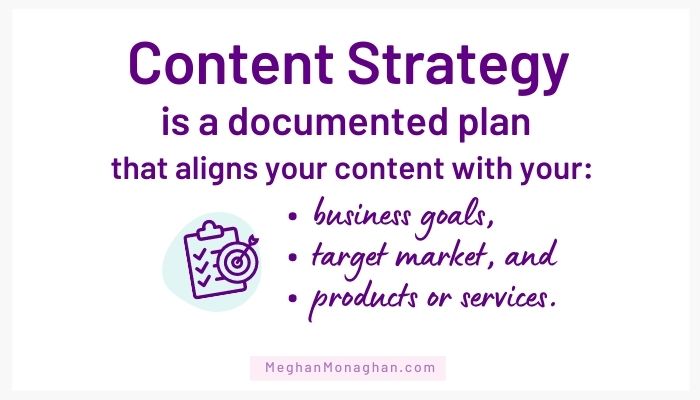
These steps guide your content so that you choose the topics, themes, and format that will attract qualified leads and align with your offers.
As part of this process, you’ll also perform a content audit to better understand your content marketing’s current effectiveness.
Together, all of this research and analysis will provide you with a direction and a solid foundation for the content you’ll eventually create.
2) Put Your Strategy Into Action with a Content Calendar
Now that your strategy is defined, it’s time to put it into action with a content calendar.
A content calendar lays out your upcoming content topics (aka keyword phrases). Therefore, now it’s time to do SEO and keyword research as well as more competitor research to determine which topics you’ll focus on.
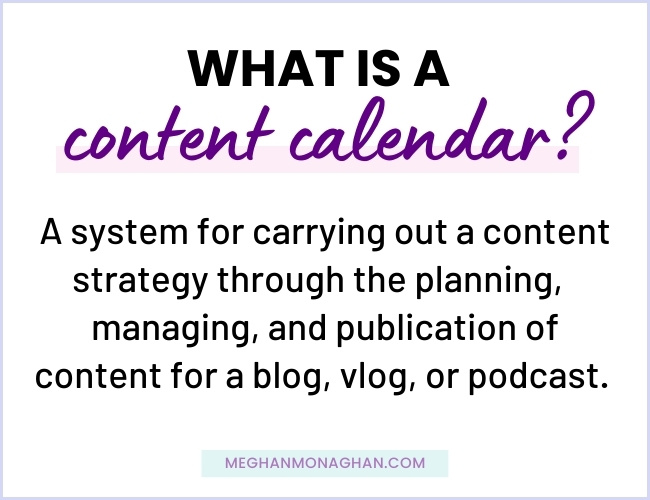
At this point, you may also perform a content gap analysis to determine topics you have missed in the past. And, this is a good time to decide which older content to update so that you can schedule it on the calendar.
With a content calendar, you plan your content ahead of time so that a bulk of the research is done when you sit down to create.
Interested in help creating your own custom content calendar? Join the waitlist for my Content Calendar training to receive a significant discount!
3) Create Content More Easily and Effectively
You’ve done a lot of prep work, you’ve got your content topic and keyword ready to roll…so it’s time to create, right?
Not quite yet!
Now that you’re at the content creation phase, you’ve still got some recon work to do.
NOTE: The more upfront work you do on the content calendar, the less research you’ll need to do when it’s time to create.
If during the content calendar step you didn’t survey the existing high-performing content and create an outline, then you’ll need to do that now.

Even if you did go deep with details on your calendar, you’ll still probably want to refresh your memory regarding what content you’ll be competing with.
So, view more search engine results pages and do some general content perusing to remind yourself how to make your content different. And, utilize a tool like Frase or Surfer to guide your content creation and make it more optimized for search.
It’s also a good time to use Google’s guidelines for creating helpful content that prioritizes your audience. This will keep you focused on content that’s written for people first versus content created primarily for ranking higher.
Interested in some insight into my content creation process? Listen to the podcast episode for some golden nuggets:
4) Remember to Assess and Analyze
There’s never an end to content marketing tasks, which means that content research is an ongoing task as well!
You can use the information and suggestions in this post to go back over your existing strategy, planning, calendar, and content to assess whether it’s working for your business. If not, it’s time to put on your research hat again!
Gather internal data on your business as well as whatever external information you feel will help you formulate an updated direction and plan.
Is Content Research Ever Done?
Beware! Research is like writing; it’s never really done. You can always edit and you can always research more!
So, give yourself parameters. Don’t allow this content marketing task to overwhelm you! Use a planner, calendar, or timer to keep content research efforts doable. Don’t forget to take notes because you’ll never remember all of the stuff you come across while researching!
And, remember this: even a little bit of research is better than none.
If you want help with your content strategy and calendar, I’m here!

I mean, I DO go places w/o looking at the weather, because well, it's always wrong! lmao But not your point. So true, we need a plan, a strategy, for everything we do or we are just going all willy nilly.. and likely the results will follow that tune.
And research, you know, if it is on the internet, it MUST be true. lol Which to your point "The main downside is that you don’t really know how reliable, factual, or accurate the information is!" Like where did Chat GPT get that… stole it from your local competitor, some old website from decades ago, from Wiki, from some opinion paper, WHERE?!
Loved the tips, but also the tools and resources. Would have to agree on Frase, not the easiest or user friendly! lol Neil Patel's Ubersuggest has been through some stages, guess I will have to check his out again, it lost some value for me… but he's always on top of things so who knows. thanks for sharing all of this valuable info Meggie!
LOL! What is it with the weather people? haha I do check the weather, btw, but that’s my personality (as you well know). I’m finding that ChatGPT has some great uses, but I wouldn’t use it like I would a Google search. At least, not in its current iteration. But AI is great at sifting through data, analyzing it, and making it more actionable. As for Ubersuggest, it’s not as robust as other, more expensive options, so I can see why it didn’t impress you as an SEO pro! But, for business owners trying to DIY their SEO and content marketing, Ubersuggest can be a handy, affordable tool. Thank you for supporting me and sharing your views! It’s always great to hear your perspective and insight.